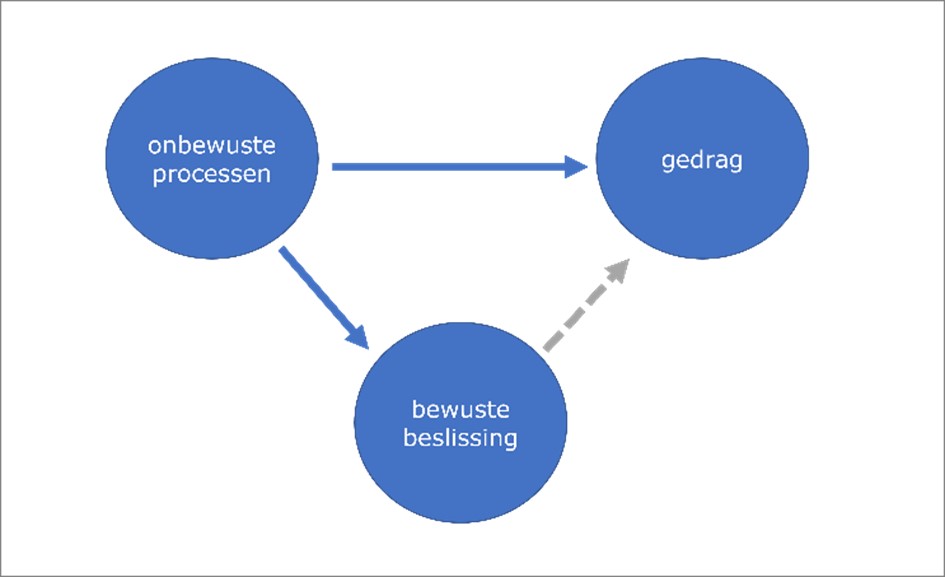Behavior is subconsciously directed.
It's important to clarify that the notion of being fully in control of your behavior is somewhat illusory. In reality, your unconscious mind largely dictates your actions, leaving little room for conscious decision-making in the moment. This concept has been supported by numerous scientific studies.
Brain Research by Libet

Benjamin Libet e.a.[i] Benjamin Libet et al.i conducted significant research into the concept of free will. Their studies focused on the timing of conscious decisions and actions. In their experiments, participants were asked to touch a point on a screen using either their right or left hand. Each participant had to consciously decide which hand to use and indicate the moment they made their decision. Meanwhile, brain activity was monitored. The results consistently showed that brain activity associated with the execution of the action occurred about half a second before the participants reported their conscious decision. This buildup of neural energy to drive the muscles suggested that, contrary to popular belief, free will does not govern our actions. Instead, our behaviors are the outcome of various unconscious processes.
The subconscious determines our behavior while we think we have done so consciously.
Model by Wegner

Daniel Wegner ,[i] a professor of psychology at Harvard, developed a model illustrating the relationship between our unconscious processes, behaviors, and conscious decisions:
In this model, it is evident that our behaviors originate from unconscious processes, a concept also supported by Libet's research. Furthermore, the model suggests that the belief we have made a conscious decision also arises from unconscious processes. Because these occurrences are nearly simultaneous, it creates the illusion that our conscious decisions are the drivers of our actions. This misconception is represented by a gray dotted line in the model, indicating that it is merely an appearance; the conscious decision at any given moment is not the actual cause of our actions.
The Riddle of our Mind
Hugo Mercier et all[i] have conducted extensive research to understand why people often make irrational choices. Their findings suggest that individuals generally make better decisions when relying on intuition rather than consciously weighing the pros and cons. Deliberative thinking does not necessarily improve decision-making. Our minds are not particularly adept at reasoning; instead, we mostly act subconsciously, and this tends to yield favorable outcomes. Mercier proposes that our minds excel primarily in social contexts—rationalizing our behavior after the fact, justifying actions, and persuading others, thereby bolstering our social standing. This capability also helps explain why we strongly adhere to our biases.
Exercise
Read the following text:
- • Vladimir Putin, the President of Russia, is, like anyone else, only human. He has two daughters, Maria and Katerina, from his marriage to Lyudmila. In 2014, he revealed that he was in love with Alina Kabayeva, an Olympic champion in rhythmic gymnastics. He has had four more children with her, including twins. He keeps his private life well-guarded to protect his family. He maintains a long-standing friendship with Berlusconi, with whom he exchanges warm letters. Vladimir Putin grew up in a drab, grim neighborhood in central Leningrad, under poverty-stricken conditions. He shared a cramped one-room flat in a communal apartment building with his parents. The building, a dilapidated nineteenth-century edifice with very limited sanitation, was overcrowded and plagued with rats. Life was not easy for Vladimir; he was often beaten by his authoritarian father but was also doted on by his mother, Maria, who affectionately called him "Volodya." For Maria, nearly forty-one and traumatized by the war and the loss of her sons, the birth of her third son seemed like a "miracle."
Do you find yourself experiencing confirmation bias when reading? Does it affect you that I portray Putin in a positive light, especially if you are convinced he is a war criminal? Were you able to read through the entire text, or did you stop reading prematurely?
Future Behavior
Your behavior at this moment is largely directed by unconscious processes. Consider this: do you consciously think about every word before you speak, or do the words just flow out, with only the possibility of slight adjustments afterward?

According to neuroscientists like Beau Lotto, our immediate reactions are shaped by these unconscious processes. However, you can influence your future behavior by reflecting on your actions. Think about whether your behavior was effective and whether a different approach might better achieve your goals next time. While "the future" may seem distant, it can also refer to any moment that follows a period of reflection. Here’s how this concept unfolds:
How to influence your future behavior? Dive into the beliefs at the root of your behavior!
[i] Hugo Mercier ea , The enigma of reason,., Penguin Books 2017, blz 175
[i] Wegner, D.M. 2002 “The illusion of conscious will”
[i] Libet, B., Gleason, C.A., Wright, E.W. & Pearl, D.K. ‘Time of conscious intention to act in relation to onset of cerebral activity’, Brain (1983) 106: 623- 642.